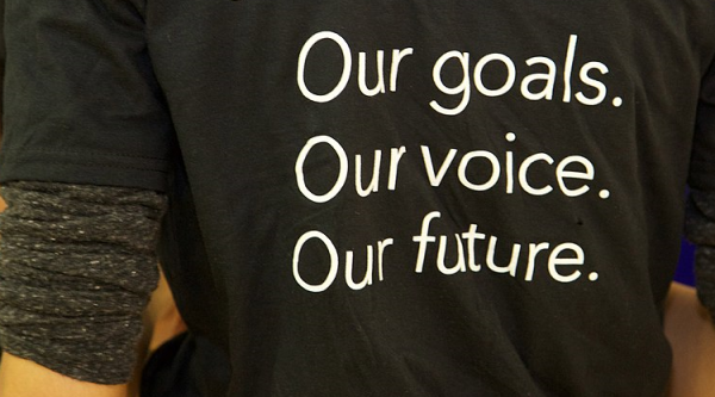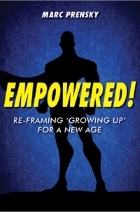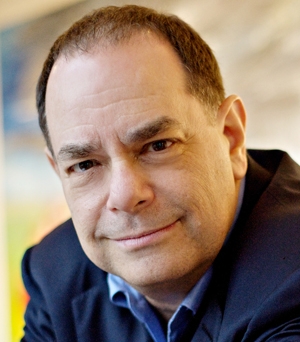Enabling Change
EMPOWERED! Re-Framing Growing Up for a New Generation, Part 1
Topics

Next generation learning is all about everyone in the system—from students through teachers to policymakers—taking charge of their own learning, development, and work. That doesn’t happen by forcing change through mandates and compliance. It happens by creating the environment and the equity of opportunity for everyone in the system to do their best possible work.
Over the next 20 years, today’s young generation, empowered in a new, accomplishment-oriented way, will begin to make enormous positive change in the world.
Note: This article is a reprint from “Chapter 1: Re-Framing a New Journey for a New Generation” of the author’s book, EMPOWERED! Re-framing ‘Growing Up’ for a New Age.

“I believe we are on the verge of developing a new kind of culture. … In this culture it will be the child—and not the parent and grandparent—that represents what is to come.”
–Margaret Mead, “Prefigurative Cultures and Unknown Children” (1973)
From a 20th-Century World to a 21st-Century World
As we start what many call the second millennium—really the 300th (approximately) for homo sapiens—all young humans are embarking on a new journey. That journey will be partly to space as more and more leave our planet. But there will be a new journey happening for young people here on Earth as well. I call it The New Journey to Empowerment.
A 20-Year Trip
Unlike humans’ journey to space, which may go on forever, I estimate that the journey to Empowerment will take around 20 years—the time for the people born in the 21st century to grow up and take the world into their own hands. This book is about our next generation, their increasing capabilities, and where they are likely to be around the year 2040 or so—if we don’t block their way.
We desperately need to look at this 20-year horizon, because today most adults are focused on a far shorter time frame, e.g., what happens to our children in the next few years, or, at most, the 10-year horizon of the United Nations’ Sustainable Development Goals and the OECD. But it is important for our children’s sake that we also focus on a somewhat longer (but still foreseeable) term—in a way few are currently doing. I hope this book will help.
The Change Is in Empowerment
Except here and there, our world is unlikely to have changed dramatically on the surface in 20 years. Most homes and buildings from the past will still exist, along with some new ones. But in 20 years there will be enormously new capabilities underneath—stemming from changes that have already begun in technology, infrastructure, and more.
It is likely that in 20 years most of the adults alive today will not have changed dramatically either. Those individuals, all born in the 20th century, may be somewhat healthier, and may have some new opportunities. Most, however, will retain their 20th century attitudes and beliefs.
Yet underneath them a new, and different, generation is rising. The capabilities of these rising humans, who have arrived into the world since the start of the 21st century, will be, by 2040, dramatically increased. Overall, they will be far more empowered to accomplish and to change things positively in their world. This new generation of humans, suddenly empowered in a new, bottom-up way, will begin to make enormous positive change in the world.
This new empowerment of the world’s young people over the next 20 years—and the positive changes it will bring—is the subject of this book. By 2040, these empowered, 21st-century-born people will comprise more than half of humanity. The results will, I believe, be profound.
Hold On…
“Wait—aren’t humans already empowered?” you might ask. “After all, we have come to completely dominate our planet—to the point of being able to destroy everything on it. Isn’t that empowerment enough?”
Perhaps, but that is not the kind of empowerment I am talking about. Certainly humanity, through the 20th century, in various groups and combinations, has done many powerful things, both positive and negative.
But very few individual humans—especially young humans—have had much power over all that time. Most have lives that are controlled by others—first by parents, then by schools, and then by employers and the vicissitudes of life. Most individual humans, up until now, just survived as long as they could—or didn’t. Some joined larger groups. Some had various kinds of careers.
Despite Margaret Mead’s famous pronouncement: “Never doubt that a small group of committed individuals can change the world—it’s the only thing that ever has,” up until now a stunningly small number of the billions of humans that have ever existed have made a difference—as individuals—to humanity. According to one researcher, out of the roughly one hundred five billion humans who have ever lived, less than five thousand individuals are remembered by name in all the world’s encyclopedias (Charles Murray, Human Accomplishment: The Pursuit of Excellence in the Arts and Sciences, 800 B.C. to 1950; Note: This number does not include politicians or generals).
Human empowerment happened through large groups—sparked, perhaps, by Mead’s smaller ones and a few individuals. Mostly, humanity has been a collection of hives. In the entire history of humankind very few individual people were empowered to do and accomplish positive things—and almost never starting when they were young (Mozart, and perhaps a few others, excepted.) Up until now, in order to accomplish useful things, most humans had to wait to grow up and become cogs in someone’s larger machine.
That Is Changing
Today, as we enter the New Age of Empowerment, this is already different. We see pre-teens creating devices that solve real environmental problems (Gitanjali Rao), teenagers beginning to organize the world's young people for change (Greta Thunberg), and 20-somethings start companies that have grown to among the biggest in the world (Google, Facebook, YouTube). They are the harbingers of what is coming.
There is a strange duality and tension, in humans, between individuals and groups. While we are all alike in a great many aspects, we are all also individuals, starting even before birth—each of whom sees the world from our own unique perspective, each of us searching, individually, for comfort and meaning.
We form, and benefit from, groups and cultures. But each individual counts—above all—to him or herself. Every one of us starts with personal dreams, and flourishes as those dreams get realized. They get realized, often, through group action, yet everything in the world that is human-made began as an idea in the mind of a single individual.
Few, in this duality, have been able to realize their individual dreams, and those who were lucky enough to do so typically had to wait for adulthood. Now they don’t have to wait. They can begin to realize dreams in the world—and show positive results—from the earliest ages. For young humans it is a new age and a new journey: a Journey to Empowerment.
Pessimism or Optimism?
In the so-called 20th century, the global human population grew from under two billion to over eight billion. That population has split, economically, into two groups: an extremely small wealthy and powerful “club” (in multiple senses of that term) and “everyone else.” Given the growth of technology—which was partly the cause of the split—the question of what will happen to that “everyone else” is increasingly on people’s minds. A growing number are pessimistic: Some see technology taking over. Many worry about the working class disappearing. Some even foresee a huge useless class of humans forming on the globe that will have to somehow be supported—or not—because they can’t support themselves.
I See Things Differently
I don’t see it like that. Certainly A.I. (artificial intelligence) and automation are coming quickly and are going to change things radically. But even with widespread A.I. and automation—and no matter how large the population grows:
Humanity will never run out of dreams to realize, problems to fix, people who need help, or people who want to help them.
The Journey to Empowerment is about the coming billions of humans finding they now have the power to do those things, and about their using that power—starting at the youngest ages, often in small teams—for the good of the world.
Read More: EMPOWERED!
- Chapter 1: Re-Framing Growing Up for a New Generation, Part 2
- Chapter 2: A New Generation Seeing Things in a New Way, Part 1 and Part 2
- Chapter 3: Re-Framing Our Young People's Times, Part 1 and Part 2
- Chapter 4: Re-Framing Who Young People Are, Part 1 and Part 2
- Chapter 5: Re-Framing Where Young People Will Live, Part 1 and Part 2
- Chapter 6: Re-Framing What Young People Believe, Part 1 and Part 2
The full book is available on Amazon.
Photo at top: DFID - UK Department for International Development, CC BY 2.0, via Wikimedia Commons.




